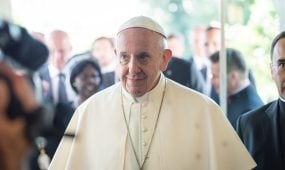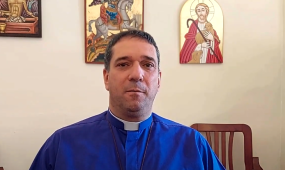Dr Andrej Jeftic reflects on history and future of WCC Faith and Order Commission
International
In a video interview, Dr Andrej Jeftic, director of the World Council of Churches (WCC) Faith and Order Commission, reflects on the commission’s history—and why the commission is relevant today
Jeftic opens the interview by offering a working definition of the Faith and Order Commission.” The name Faith and Order refers to two core aspects of the commission: faith encompassing theological beliefs and doctrines, while order refers to church structures, church practices, and church governments,” he explains.
He also offers an overview of how the WCC Faith and Order Commission was formed, and how it grew into its current functions today.
Advertisement
Recalling when he was newly appointed as the director, Jeftic says he was “really excited, really grateful, and humbled,” as he recalls reading about the commission during his student days at the University of Belgrade.
When speaking on the relevancy of the Faith and Order Commission today, Jeftic reflects that the world needs unity more than ever.
“I would say that the world, as we witness it today, has many features that make people rather dissatisfied with it,” he said. “First of all, we can witness that, despite globalisation taking place and despite the fact that the whole world is being united with technology and means of communication and so on, there is a lot of polarization taking place”.
He also relates the reaction of churches together with the systems of values they share. ”There are various contemporary challenges that we face in the world such as violence, climate change, and so on, and I believe those challenges require our reaction—especially the churches’ reaction,” he said. “Churches do react rather strongly and they react together but I believe it’s quite important that churches share the same system of beliefs and the same system of values.”
Advertisement
Jeftic believes those systems are where common action comes from. “Therefore, addressing these core beliefs, core values that churches share or don’t share, that unite them or disunite them, is what can help churches further not only grow toward ecclesial unity but also act together in addressing these pressing and rather hard challenges that today’s world is facing,” he said. “Quite essentially, I believe Faith and Order work has always been around unity.”
Jeftic shares of a vision of helping churches grow in their witness to the world.
“We should probably try to be better and even bold with developing new methods and new forms of communicating our work with the fellowship but also with the world,” he says. ”There are many issues that are rather divisive and are causing polarization, and it is the mission of Faith and Order to address these issues that cause the divisions, so I believe we need to always focus on unity, on bringing churches together, and facilitating the dialogue.”
Jeftic also looks forward to the Sixth World Conference of Faith and Order in 2025. ”This brings us an incredible opportunity to be together, to exhibit the unity that we have, to address the disunity we still have, to offer common witness but also to set a milestone and open up the new era of the work of the Faith and Order Commission.”
First published on the World Council of Churches website on 21 September 2023.





